Enfield Board moves to Public Hearing proposals for appointed Highway Super, Clerk
by Robert Lynch, June 30, 2020; updated July 1, 2020, 8:00 PM
Despite a last-minute petition warning the Enfield Town Board not to go there, it did just that.
By successive 4-1 votes, the Enfield Town Board Tuesday (June 30th) advanced to Public Hearing two controversial local laws, both offered by Supervisor Beth McGee, that would make the currently-elective positions of Highway Superintendent and Town Clerk appointive, effective January 2022. Voters would also need to approve both measures at referendum.
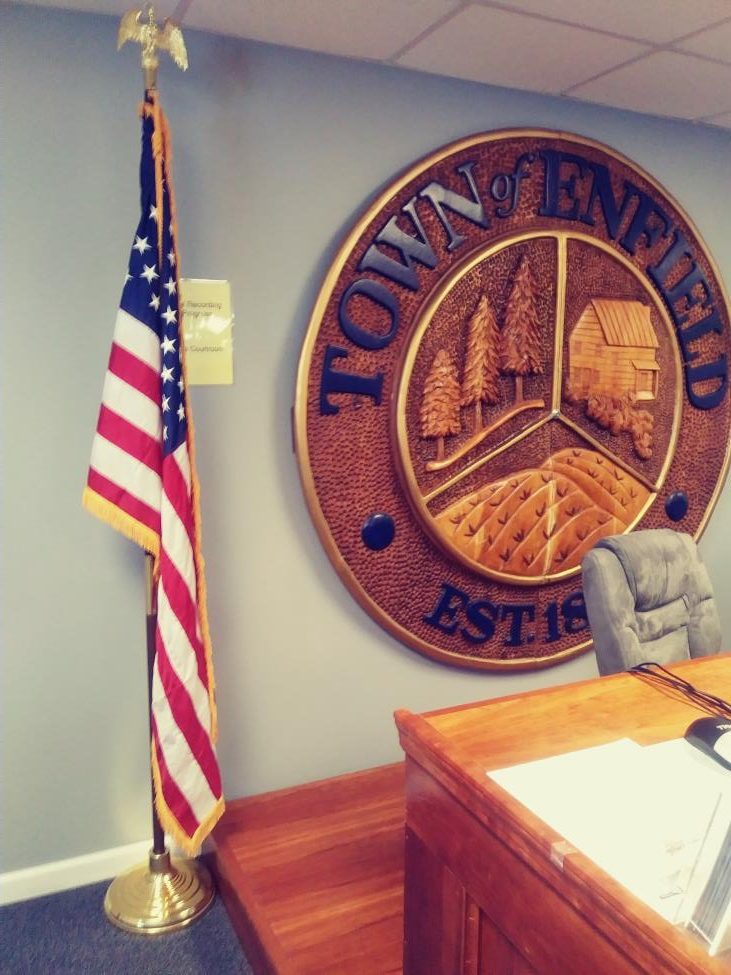
“I think the residents should be able to decide this and voice their opinion on this regardless of whether people in these positions are throwing a tantrum,” said Councilperson Stephanie Redmond.
“It’s going to divide this Town this fall and invariably these measures will go down to defeat,” countered Redmond’s colleague, Councilperson Robert Lynch (this writer), who cast the lone dissents.
Before Tuesday’s votes, McGee withdrew a pair of companion, yet conflicting proposals she’d earlier offered that would have terminated even sooner the terms of Highway Superintendent Barry (Buddy) Rollins and Town Clerk Ellen Woods. Those withdrawn measures would have canceled Rollins’ and Woods’ positions this December, mid-way through each incumbent’s term of office.
McGee also withdrew another proposal that would have lengthened future terms of Town Supervisor from two years to four. She offered only vague explanations for her several withdrawals.
After opposing the two McGee proposals, Councilperson Lynch then dropped his own initiatives that would have kept the highway and Clerk’s posts elective, but lengthened future two-year terms to four. He said the Board’s favored options placed his own proposals in conflict.
Less than a half-hour before Tuesday’s meeting, Clerk Woods circulated to Board members a petition, signed by 115 Enfield residents, opposing the changes the Board’s majority would later advance.
Entitled “Enfield’s Democracy is in Danger,” the petition insisted that, “Enfield voters should always have the right to CHOOSE a qualified Clerk and Highway Superintendent who live in the Town of Enfield, where they can respond quickly to YOUR needs.”
But the petition went further, demanding that if Supervisor McGee resigns—as she has stated her intention to do—McGee not engineer her departure so as to allow Redmond to succeed her as Supervisor without a special election.
“The people of Enfield deserve the RIGHT to VOTE for the next Town Supervisor on Tuesday, November 3, 2020,” the citizen petition implored. It asserted a similar demand for any new Councilperson the Town Board might name to fill the seat Redmond would vacate.
The Board—again, with Lynch dissenting—set Wednesday, July 22nd for the proposed laws’ Public Hearing. After the Hearing, the Board could place the laws onto the November ballot.
Tuesday’s meeting brought into public view the tension building between Supervisor McGee and Clerk Woods, friction observed by Board members in recent weeks in emails between the two.
“Ellen, you’re embarrassing yourself; stop. It’s such a lack of decorum,” McGee interjected during a point in Tuesday’s zoom meeting, when an animated Woods attempted to speak through a mic McGee had already muted.
McGee only permitted Woods to enter the debate after Councilperson Lynch explicitly sought her opinion. Woods seized the opportunity to criticize McGee for her alleged tactics in engineering her Deputy Supervisor’s presumed succession. The Clerk also accused the Supervisor of “cronyism” in the way she appoints subordinates.
“An elected Town Clerk has an inherent dignity,” Woods asserted, defending her current office. Woods also maintained that an elected Clerk provides a “check on the Town Board;” and that were her position made appointive, the Board would need to “triple my line,” referencing her current $20,000 salary.
Supervisor McGee, meanwhile, defended her likely resignation’s timing. She’d first revealed her intentions last March, but then delayed her departure when the COVID-19 pandemic struck.
“I will decide when and if I resign,” McGee said tersely, yet defiantly, responding initially to the petition and not to Woods. But the Supervisor clearly ascribed Woods as the petition’s author.
Resignation timing “isn’t going to be determined by the Town Clerk in a petition that she’s put together,” said McGee. “It’ll be determined by me.”
“If people would like me to toss the Town up in the air and, you know, just leave now, I guess I could do that,” the Supervisor stated. “But that’s against my moral fiber,”
Defending the proposed transition to appointive Clerk and Highway positions, Councilperson Mimi Mehaffey took note of Rollins’ absence from Tuesday’s session, despite highway maintenance, she estimated, eating up 70 per cent of the Town’s budget.
“It feels to me that the Town Board and most of the budget is being hijacked by one person and that’s scary to me, and that’s why I’m in favor of putting this on the ballot,” Mehaffey remarked.
Lynch countered that the public elects the Highway Superintendent. “He’s not somebody who just comes in out of the cold and decides he’s going to run the Highway Department.”
Of the likely referendum, Lynch observed, “I think we’re forcing this on the people because of personality disputes between this Town Board—some members of the Town Board—and these two elected officers,” namely Rollins and Woods. And if the laws are put onto November’s ballot, Lynch asserted, “I’ll campaign against them… promise.”
But “It’s important for the residents to have a voice in how the Town is run,” pleaded Redmond, suggesting Lynch doubted voters’ competence to decide the issue correctly.
Councilperson Virginia Bryant supported the changes, arguing the current governing arrangement is “very unwieldy,” given the semi-autonomous nature of the two offices at issue. And Supervisor McGee challenged Lynch’s assertion that eliminating the elective offices would place control of key Town operations in the hands of too few, just the three comprising the Board’s majority.
“It’s unfair to suggest that five people who are actually elected to represent the Town as a governing Board” would overly concentrate control, McGee asserted. “The five people check each other.”
Lynch answered that if the local laws pass at referendum, he would move to expand the Town Board from five members to seven. That way, he said, the control would rest with four people, not just three.
###
Municipal leaders urge Tompkins lawmakers revisit shortened terms
Dryden’s Lane suggests hated weighted voting alternative
by Robert Lynch, June 26, 2020
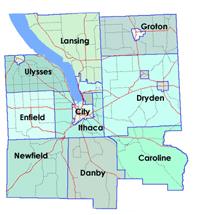
Representatives from Tompkins County’s towns and villages urged their County Legislature Thursday (June 25th) to revisit a proposal—shelved at its last meeting—that would shorten members’ upcoming elected terms so as to speed the Legislature’s eventual reapportionment.
The Tompkins County Council of Governments (TCCOG), its members drawn from each of the County’s towns, villages, and the City of Ithaca, recommended that the County Legislature reconsider at its July seventh meeting a rejected committee proposal that would impose a one-time shortened term in the 2021 legislative election, a change that would enable redistricting to occur two years earlier than otherwise possible.
Should the Legislature fail to act, realigned, population-balanced districts would not take hold until January 2026, more than a half-decade after the decennial U.S. Census.
“That’s way too long to be out of whack with the population,” said County Legislator Martha Robertson, who steered TCCOG members toward their unanimous endorsement of quicker action.
Before they voted, TCCOG members—and the public—first learned that Robertson’s Dryden colleague, Mike Lane, a staunch supporter of speedy reapportionment, will propose the Legislature adopt a weighted voting plan should it delay redistricting until mid-decade. Lane confirmed his intentions Friday morning.
“As to weighted voting, I sincerely hate the idea (and question its constitutionality) but it is superior to having districts continue for another five years being under or over represented,” Lane said.
Lane recalled that when the County Legislature briefly imposed weighted voting upon itself in the 1970’s, the experiment “was not appreciated by many residents,” though it did motivate quicker reapportionment.
“Having said that, if we do not shorten our terms to provide for equal geographic representation more quickly, after the Census I will propose that we go to a weighted voting system,” Lane indicated. The long-serving Dryden Democrat fears inaction might leave the county “open to a lawsuit.”
Under weighted voting, a practice employed in some other counties, each representative’s legislative vote is assigned added statistical weight proportionate to its district’s relative population. Vote counts always await the sum of the calculator.
At its last meeting June 16th, Tompkins County lawmakers deadlocked 7-7, and thus killed, a committee’s recommendation that it proceed to elect legislators to shorter two-year terms in 2021, not for the usual four years. But at least one of the dissenters in June’s ballot would need to move reconsideration for a revote to occur. The June dissenters included both of Enfield’s County Legislators, Anne Koreman and David McKenna.
As Dryden’s Robertson directed Thursday’s discussion, TCCOG members bypassed Legislator Lane’s June alternative that would have redistricted even sooner, having lawmakers stand for only a single-year term in 2021, making a reapportioned Legislature possible as soon as early-2023. While all agree COVID-delayed census data makes reapportionment impossible next year, Robertson and others—but not Lane—also fear that line-drafters could not complete their task even given 12 added months.
Lane would prefer Legislature elections move to coincide with those for Governor, when voter turnout increases. But others favor the elections remain in the off-years, when town and Ithaca City voters also choose their leaders.
“I don’t think we have the power to go to any of the legislators and say this is the way it’s going to be,” warned TCCOG co-chair Elizabeth Conger of Groton. Nonetheless, the adopted TCCOG Resolution makes plain it favors the “two-plus-four year” option, not Lane’s alternative.
“I feel ever so strongly that this is a constitutional issue of equal protection and that all Legislators should recognize it, and understand their obligation to bring equal voice to the people who reside in the various districts,” Lane said Friday, signaling he’d likely accept the “two-plus four” plan, rather than his own, as preferable to the current course of doing nothing.
“We can’t wait until January 2026 to have a reapportioned Legislature,” agreed Enfield TCCOG representative Robert Lynch (this writer.)
As she guided Thursday’s discussion, Robertson also indicated her strong preference for returning the County Legislature to odd numbered membership once it redraws its lines.
Though the body abandoned an odd-numbered headcount during its last redistricting—members at the time dismissing the prospect of deadlock—subsequent tied votes in the 14-member group have proved frustrating, most notably earlier this year when it took eight rounds of voting over four successive meetings spanning two months to break a logjam and elect a Legislature Chair.
The action sought in July is only procedural, to direct the County Attorney to draft a proposed law subject to a Public Hearing and a November referendum. Acknowledging the in-the-weeds nature of the process, Robertson conceded, “It’s a little harder to explain than goes on a bumper sticker.”
###
Zoom Zoos forever? County, Enfield officials talk about online meetings’ continuation
by Robert Lynch, June 25, 2020
“People have adapted,” stated Tompkins County Administrator Jason Molino.

In his morning weekly conference call with local municipal officials, Molino predicted Thursday (June 24th) that online town or village Board meetings, initiated throughout New York to comply with Governor Cuomo’s rules to combat COVID-19, may remain with us, in some form, “in perpetuity.”
Molino responded to questioning by Enfield Supervisor Beth McGee and others as to whether online meetings can legally continue after Governor Cuomo’s executive order suspending portions of the New York Open Meetings Law is set to expire July 7th.
Molino acknowledged he had “no answer” as to whether the Governor would extend the exemption, but added that in his “personal opinion,” the executive order will be renewed.
“There’s so much more engagement online,” McGee remarked, the Enfield Supervisor concluding that virtual zoom meetings, initiated by her in March following Cuomo’s imposition of attendance restrictions, have spurred public attendance at her Town’s governing sessions, an opinion that others debate.
McGee added that should her Town choose—or be required—to convene again in person, and that should it also attempt to continue its virtual presence, as she would like it to do, technology would preclude her initiative.
“We can’t be all in the same room using zoom,” McGee told conferees.
At least one Enfield Town Board member has privately stated her desire to remain meeting virtually, concerned with other states’ sudden spike in coronavirus cases. Tompkins County statistics, updated June 24th, reported just one active COVID-19 case locally.
While several on the Enfield Board have yet to indicate their meeting preference, Councilperson Robert Lynch (this writer) has urged the Board return to its block and stucco meeting room.
“I like to look my fellow legislators in the eye, all in one room, not through a computer screen,” Lynch stated Thursday. “I want to feel the body language, both of my colleagues and of our constituents,” he added. “Placing us all in the same place at the same time achieves dynamic rewards. We cannot retreat to our own corners, our own safe places. We’re forced to face one another, invade each other’s personal space a bit; confront, yes; but also compromise.”
Yet, in his Thursday conference call, Molino cautioned that lingering state rules—including masking and social distancing orders—could complicate any in-your-face interaction.
Answering Ulysses Supervisor Nancy Zahler, Molino predicted that even if meeting attendees wore masks, rules might still separate them by six feet.
“If 30-40 people attend a Public Hearing,” warned the Administrator, “it may not be good to have it indoors.” He noted gubernatorial orders still mandate reduced building occupancy, even though Phase 4 rules, which take effect locally Friday, June 26th, will allow public gatherings of as many as 50.
While Molino implied an outdoor hearing might prove a novel alternative, he also hinted that governments could adopt the DMV’s approach; having a door-keeper to let in one hearing attendee at a time. He further urged that even if distanced, attendees should wear masks since absolute six-foot separation indoors remains “virtually impossible” to insure.
On another topic, Thursday’s conferees raised Governor Cuomo’s Wednesday executive order demanding a 14-day quarantine of travelers into New York from high-risk COVID states, including Florida.
Molino conceded Cuomo’s travel advisory “isn’t enforceable,” even though the Governor’s directive states the order “may be enforced pursuant to article 21 of the public health law,” and that violators could face civil penalties of up to $10,000.
“We’re going to be using a diplomatic approach,” advised Molino. Additionally, responding to Trumansburg’s mayor, the Administrator suggested, pending further guidance from Albany, that business travelers returning from high-risk states could quarantine their mandated two weeks at home, but only during their personal hours. They could, he said, still go to work.
###
Kelles surge could prove unstoppable
Ithaca legislator builds large same-day lead in Assembly race
Ithaca lawmaker’s Enfield tally more than doubles that of next-place finisher, Sujata
Posted June 24, 2020; 2:45 PM; updated June 28, 2020
Ithaca’s Fall Creek representative on the Tompkins County Legislature, Anna Kelles, built up what could prove an insurmountable Democratic Primary lead over six challengers Tuesday (June 23rd) in her quest to succeed retiring Assembly member Barbara Lifton in the New York State Assembly.

In the lead for NYS Assembly
With machine totals of same-day and early voting now essentially complete, Kelles secured nearly one-third of the approximately 5,300 machine votes cast across the two-county 125th Assembly District in the Tuesday Primary.
If thousands of mailed-in Absentee Ballots—yet to be counted—sustain the current front runner’s dominance, Kelles would advance to face Republican nominee Matthew McIntyre in November. Democrats command a significant advantage among the 125th District’s electorate.
Tuesday’s unofficial District-wide results, all machine totals, placed Kelles with 1,751 votes (32.8%), 710 votes ahead of next-place finisher, Ithaca Alderperson Seph Murtagh (19.5%). Third-place stands as an effective tie between Ithaca attorney Sujata Gibson (15.0%) and Lifton aide Jordan Lesser (14.9%) Just three votes separated Gibson and Lesser.
Rounding out the crowded field of candidates were Dryden’s Jason Leifer (5.9%), and two Cortland County candidates, Beau Harbin (4.9%) and Lisa Hoeschele (3.7%). The majority of Harbin’s and Hoeschele’s votes came from Cortland County, where the two registered first and second, respectively.
In the Town of Enfield, Kelles’ victory percentage exceeded that for the District or for Tompkins County overall. Of the 143 Enfield ballots cast Tuesday, Kelles received 64 votes, or 46 per cent of the total, more than twice the number given the next-place Enfield finisher, Gibson (29 votes, or 21%). The Enfield count placed Lesser in third place with 20 votes (14%), Murtagh in fourth with 18 (13%), and Leifer in fifth with six votes. Harbin and Hoeschele received one vote each.
[Note: Updated tallies, which include machine early-voting as well as that at the Enfield polling spot, kept Kelles in the Enfield lead with 68 votes to Gibson’s 31, Lesser’s 21, and Murtagh’s 18. Other candidate tallies remained unchanged.]
Within Tompkins County alone, Kelles led with 36.3 per cent of the in-person votes cast. Murtagh came in second with 21.7 per cent, Gibson third with 16.6 per cent, and Lesser fourth with 15.8 per cent. The remaining candidates fell into single-digits.
The Kelles’ campaign’s dominance in the seven candidate political free-for-all contrasted with Jordan Lesser’s relative underperformance, that despite his endorsement in the campaign’s final days by incumbent Lifton. What’s more, many observers expected Murtagh, endorsed by Ithaca Mayor Svante Myrick along with many of Murtagh’s Common Council colleagues, to finish closer to Kelles than he did.
If anyone, other than Kelles, exceeded expectations, it was Gibson. The Ithaca attorney showed surprising second-place strength in Enfield, and remains a viable contender overall. Some have viewed Gibson as a more liberal alternative to Kelles, and Gibson has seized on Kelles’ stands on local development and other issues. Gibson, herself, has undergone criticism for the controversial positions she’s taken on mandatory childhood vaccinations and the alleged health hazards of 5G mobile cell phone transmissions.
None of the seven candidates has yet announced his or her withdrawal from the race. Neither has Kelles claimed victory. Celebrating her first-place lead in a video conference Tuesday night with supporters, Kelles stressed that before declaring victory, she wanted to wait the counting of the many outstanding Absentee Ballots. “We want every vote to count,” Kelles emphasized.
During recent candidate forums, each of the seven Democratic Assembly candidates had pledged to support the party’s eventual nominee. Kelles already carries the endorsement of the Working Families Party. Others, should they choose, could petition for an independent ballot line, soliciting signatures during a yet-to-be-scheduled petitioning period, one earlier postponed by Governor Cuomo amid fears of COVID-19. No Democrat has announced whether he or she will rescind his or her previous promise.
Though currently-tallied New York State Board of Elections figures suggest the Cortland County component of the 125th District’s tally remains only partial, Cortland County Elections Commissioner Thomas Brown insisted Wednesday that the current totals stand “essentially complete,” any reporting discrepancy resulting from his county’s need to consolidate election precincts for the Primary.
Meanwhile, the race for Tompkins County District Attorney could bring an upset. Machine totals from both early-voting and Tuesday placed Ithaca attorney Edward Kopko in the lead over incumbent DA Matthew Van Houten. Kopko, who capitalized on his advocacy of criminal justice reform and initiatives against racial bias, currently leads Van Houten countywide 57.5 per cent to 42.4 per cent. Van Houten carried same-day Enfield voting, but just barely, receiving 61 votes to Kopko’s 56.
Now, the long wait. For this, the first time, in an effort to deter in-person voting and stem the coronavirus’ spread, New York authorized any primary voter, regardless of circumstances, to request an Absentee Ballot. Thousands locally did. Staff at Tompkins County’s Board of Elections reported Wednesday that as many as 11,000 Absentee Ballots were mailed, roughly twice the number of persons who voted in-person. While trends may be inferred from Tuesday’s results, final results could change, those officials cautioned.
Tompkins and Cortland County elections staff expect to begin Absentee Ballot counting July first. Winners might not be declared until mid-month.
###
Kelles takes Enfield, County, and District same-day vote
June 23, 2020; updated 1:45 AM, June 24, 2020
Breaking: Tompkins County Legislator Anna Kelles took a landslide lead among Enfield voters in the Same-Day voting Tuesday for the Democratic Nomination for New York State Assembly. Kelles also leads throughout Tompkins County and throughout her two-county District.
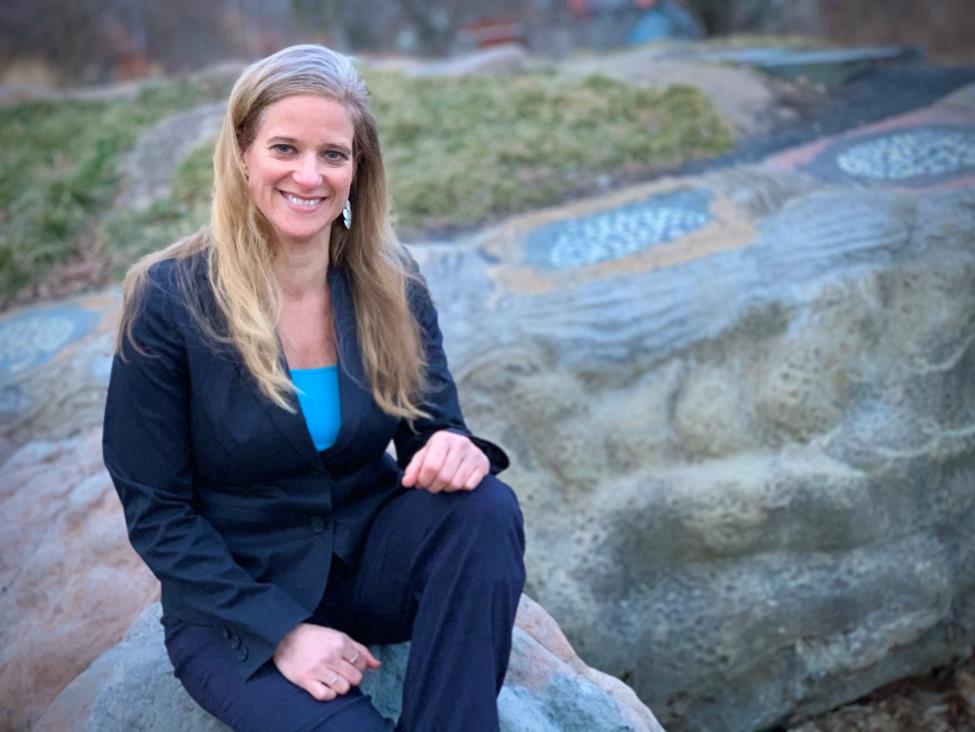
Same-day Enfield voting totals released shortly after 9 PM Tuesday (June 23rd) at the Living Water Church polling site showed Kelles earned more than twice the votes of her next-closest competitor, Sujata Gibson.
Machine data showed Kelles with 64 votes (46 per cent). Gibson secured 29 votes (21%). Following Gibson was Jordan Lesser with 20 votes (14%) and Seph Murtagh with 18 (13%).
Candidates rounding out the race in Enfield were Jason Leifer with six votes, and Cortland County candidates Beau Harbin and Lisa Hoeschele, each with one vote.
A total of 143 same-day votes were cast in Enfield. Four voters did not express a preference in the Assembly race.
With 100 per cent of the Tompkins County voting precincts reporting shortly before 11 PM, Kelles led with 36.3 per cent of the in-person votes cast. Countywide, Seph Murtagh came in second with 21.7 per cent , Sujata Gibson with 16.6 per cent, and Jordan Lesser with 15.8 per cent. The remaining candidates stood in single-digits.
With most, but not all precincts reporting within the two-county 125th Assembly District, State Board of Elections figures early Wednesday morning showed Kelles leading with nearly 33 per cent of the vote, Murtagh with 19.6 per cent, Gibson with 15.1 per cent, and Lesser with 14.9 per cent.
Though all Tompkins County election districts have reported results, a full 40 per cent of those in neighboring Cortland County had not yet reported returns even past Midnight. But in those precincts reporting, both Cortland County candidates, Harbin and Hoeschele, did well. With 21 of 35 Cortland County districts reporting, Harbin came in first with just over 30 per cent of the vote, and Hoeschele second with 22.2 per cent. In those Cortland County precincts reporting, Kelles came in third at 15.2 per cent, with Lesser fourth.
The upset of the night in Tompkins County may be for District Attorney, where Ithaca attorney Edward Kopko established a solid lead over incumbent Matthew Van Houten. With 100 per cent of the machine voting reported, Kopko received 57.5 per cent of the vote, Van Houten 42.4 per cent.
In Enfield, the race for County District Attorney remains close. Van Houten stands in the Enfield lead with 61 votes (52%). Kopko remains just five votes behind at 56 (48%).
Because of COVID-19, all voters were encouraged this spring to apply for absentee ballots to cast votes in the June primaries. The Tompkins County Board of Elections issued many such Absentee Ballots. Indeed, as many as half, perhaps more than half, of the ballots cast in these races are likely to be mailed-in Absentee Ballots, not likely to be tallied before July 5th. One source indicated that as many as 8,200 Absentee Ballots were issued for the Assembly election, 7,000 of them in Tompkins County.
Additionally, voters had the opportunity to cast early votes in the days before the Primary election. At least a handful of Enfield voters did so. The county-wide totals reported Tuesday night likely include early voting, but the Enfield machine totals do not.
While inconclusive as to the final outcome, the same-day tallies can be used to spot trends. And judging from the votes cast Tuesday, Anna Kelles remains the candidate to beat.
No candidates have yet claimed victory or conceded defeat, all awaiting the Absentee Ballot count.
The eventual winner of the seven-way Democratic Primary will go on to face Republican nominee Matthew McIntyre in November. Both candidates will seek to replace the retiring nine-term Democratic incumbent, Assembly member Barbara Lifton.
Celebrating online with supporters Tuesday, Kelles stressed she won’t claim victory until every vote is counted. Yet, the Ithaca lawmaker reacted with jubilation and high spirits.
“I couldn’t have done this without you,” Kelles said to her campaign team.
###
###
Supervisor Postpones Hearing; calls for further work on Terms of Office laws
by Robert Lynch, June 18, 2020
Seven hotly-contested proposed Local Laws, some of which would transform the elective Enfield offices of Town Clerk and Highway Superintendent to appointive positions, will go before the Enfield Town Board for further work before facing citizen scrutiny at a Public Hearing.
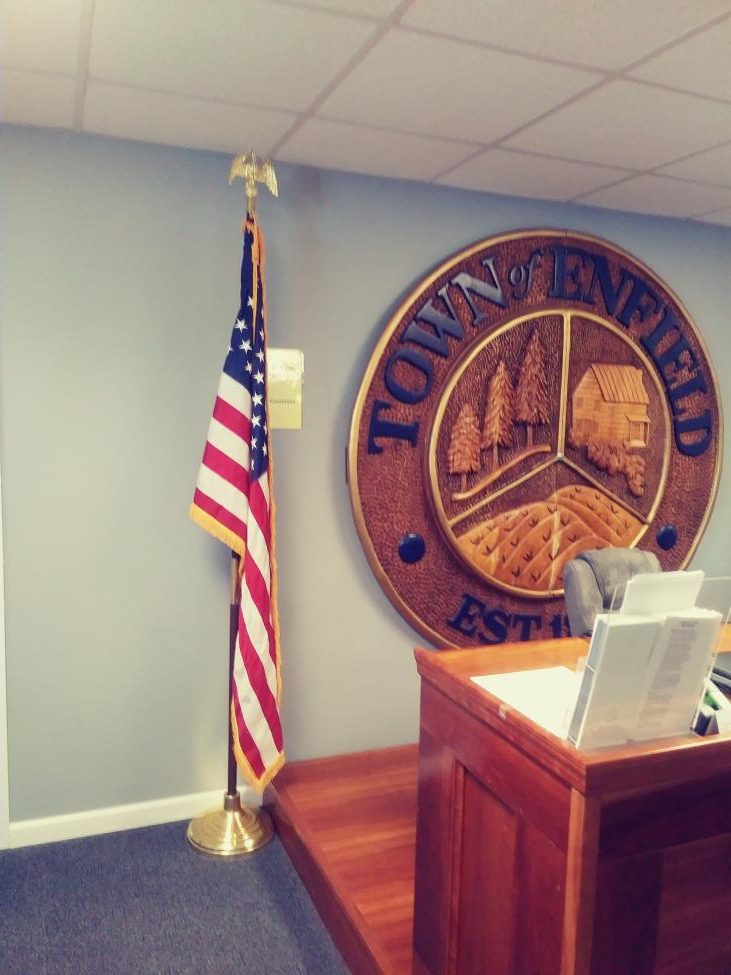
Town Supervisor Beth McGee late Wednesday (June 17th) on the Town’s website, announced her postponement of an earlier-scheduled June 30th Public Hearing, indicating postponement came at the advice of the Town’s legal counsel, Guy Krogh.
“As Town Supervisor, after consulting with our attorney, I have determined we are not quite ready to bring these proposals to Public Hearing, as it’s not clear what the board intends by proposing them,” McGee wrote in her statement.
“An official notice of the Public Hearing was not published due to confusion as to the nature of the proposals and potential conflicts in the outcomes should any or all of them be adopted,” the Supervisor added.
The alleged confusion, presumably flagged by attorney Krogh, involves the overlapping nature of the seven proposed Local Laws. For example, two of the proposed laws would eliminate the elected position of Highway Superintendent, making the position subject to Town Board appointment. Another pair would similarly change the office of Town Clerk.
But in each instance, one proposal would terminate the elected officer’s position in the middle of its current term, namely at the end of this year, while its complement would allow the incumbent to continue until his or her current term expires on December 31st, 2021.
An additional two proposed laws, advanced by Councilperson Robert Lynch (this writer), would retain the elective status of Town Clerk and highway chief, but extend the length of those offices’ future terms from two years to four. A proposed law advanced by Supervisor McGee would authorize a future extension of her own office, but only for future terms.
McGee indicated at the Town Board’s June 10th meeting that she does not intend to seek reelection.
At that prior meeting, by identical 4-1 votes, with Councilperson Lynch the lone dissenter, the Town Board agreed to consider the terms-of-office changes and schedule the June 30th hearing, now postponed.
After any future legally-mandated Hearing the Enfield Board might schedule, members could vote to advance any—but presumably, not all—of the seven, sometimes mutually-exclusive initiatives to a November referendum, also a legal requirement for adoption. Since the statutory deadline for ballot submission falls in early-August, procedural requirements leave little time for the Board to delay.
McGee’s Wednesday statement made clear that despite the Public Hearing’s postponement, the June 30th Town Board meeting will proceed as otherwise scheduled, with the terms of office issue remaining on its agenda. McGee urged those interested to speak out during the online meeting’s Privilege of the Floor.
“The Town Board will use this meeting to clarify the goals of the proposals and make clear what the Public is being asked to consider,” the Supervisor said in her statement.
Councilperson Lynch has expressed strong opposition to the proposals that would abandon the elective nature of Town Clerk or Highway Superintendent. He has also objected to lengthening the Supervisor’s term. Lynch has said he’s open to consider longer terms for the other two offices, but has not necessarily endorsed the measures he’d, himself, submitted to accomplish the change,
Others on the Town Board, including Supervisor McGee, have not publicly stated their preferences among the seven alternatives.
###
COVID storm passes, Tompkins’ leaders refocus from virus to police
by Robert Lynch, June 18, 2020
One senses that at least locally, at least momentarily, the storm clouds better known as COVID-19 have passed.

To this participant—and reporter—that was the feeling he got when joining a Thursday morning (June 18th) conference call with municipal leaders and Tompkins County administrators in what’s become a weekly ritual to address emergency measures taken since the coronavirus struck in mid-March.
For one thing, the call was shorter; ending 37 minutes after it began. Contrast it with the hour-long sessions of many weeks past. Also participants were fewer. But most important—though I didn’t keep score—callers focused less on the virus and more upon Governor Andrew Cuomo’s six-day old executive order mandating a comprehensive review of local police procedures in his drive to root out systemic racism.
One caller even asked how municipalities should cope with Cuomo’s sudden—and unilaterally-imposed—dictate that Juneteenth, Friday, June 19th, become a State employee holiday.
Whereas I usually jot down three or four pages of notes to write these weekly summaries, I found Thursday’s scribblings filled barely a page-and-a-half. In the fight against COVID-19, perhaps it’s progress, or maybe boredom. County Administrator Jason Molino announced calls would transition next week to biweekly events, perhaps monthly sessions soon after.
Molino reported that active local COVID-19 infections now stand as few as eight. Latest statistics (June 17th) placed no local victim in the hospital. The virus’ only fatalities remain the two patients brought here from New York City weeks ago. Since March, 166 locally have tested positive, but fully 158 of those have now recovered. Tompkins, like much of Upstate, stands in Phase 3 of its reopening. Molino’s report carried the assumption we’d enter the final reopening stage, Phase 4, at the end of next week.
Indeed, the most common municipal question, raised by several commenters, was whether local boards could ditch the zoom conference and return to in-person meetings. The Governor’s waiver of the Open Meetings Law expires in early-July; and a June 15th executive order raises permitted crowd sizes to 25. Molino promised he’d research the question.
So the mayors, Town Supervisors… and Molino turned to police reform.
Burdening many was the Governor’s thousand-word executive order, signed June 12th in response to the George Floyd killing. His edict demands a top-to-bottom, inside-out examination of local police “deployments, strategies, policies, procedures, and practices” to ensure they do not discriminate against people of color. Meetings must be held, hearings convened, and reports written, all by next April first. And every police department, even the tiniest in T-Burg and Dryden, must do it.
Overwhelmed, leaders like Dryden Supervisor Jason Leifer and Trumansburg Mayor Rordan Hart, sought help.
“Do you have a template document,” asked Hart, “so we’re not reinventing the wheel?”
“I hear your frustration,” answered Molino. “I’m hopeful there will be guidance from Albany,” the Administrator suggesting the State Legislature may soon put some needed flesh on the Governor’s impulsive, though demanding, bare bones.
And the County Administrator hinted that each small-scale village force need not go it alone. He suggested a “collaborative, countywide approach to getting input;” to “engage the public collectively.”
With restaurants reopening, and many County workers coming back to their offices next week, Molino and others conveyed relief and a sense that the worst of a three-month, hunker down war-on-germs was now behind them.
But, as so often occurs these days, it’s on to the next crisis.
###
Tompkins will recruit Diversity Officer, despite Hiring Freeze; other cuts
by Robert Lynch, June 17, 2020
Make no mistake. The Minnesota death of George Floyd has impacted Tompkins County Government and how that government will spend your taxes.

At a meeting where the Tompkins County Legislature slashed some retirees’ health care benefits, and with nearly 100 County employees on furlough, with further long-term layoffs a possibility, the County Administrator announced Tuesday (June 16th) he will carve an exception to an ongoing hiring freeze to recruit a highly-paid, yet seldom-retained-elsewhere Chief Equity and Diversity Officer.
“We’re going to move on hiring that position,” said Administrator Jason Molino, revealing his change in plans to the Legislature without fanfare in comments buried within a larger report detailing his Administration’s “Equity and Anti-Racism Strategy.” Molino’s briefing clearly sprang as a reflection of nationwide concern over systemic racism following the killing of the unarmed Floyd during his arrest by Minneapolis police.
Legislators warmly greeted Molino’s announcement, Democrat Anne Koreman predicting the Diversity Officer will play a “key role” in addressing racial issues in County Government.
Only last month Molino announced that the Diversity Officer’s job, included for the first time by the Legislature in the current year’s budget, would remain as one of 32 vacancies left unfilled to save money and address the financial fallout of COVID-19. Tuesday, Molino indicated he’d move forward not only with recruiting the Diversity Officer, but also in filling the vacant position of Human Resources Commissioner.
Seldom precisely defined, the management-level Chief Equity and Diversity Officer would review the racial impact of County governmental actions, and in the words of an October 2019 news release, would “be focused on building trust within the organization and in the community, and providing equal access to all employees and residents.” Current Legislature Chair Leslyn McBean-Clairborne, herself African-American, stands as a driving force behind the new hire.
The County’s current budget sets aside $134,500 in salary and benefits for the Diversity Officer, a position unique to counties of Tompkins’ size. Among municipalities upstate, only the City of Buffalo employs such an administrator.
After hearing Molino’s report, the Tompkins Legislature, without dissent, affirmed the Administrator’s plan to radically revise health care coverage for the County’s 194 Medicare-eligible retirees. About one-third of that number, 68, generally the more recent retirees, would face stiff premium increases from the current $25 per month to an eventual $263 per month, or $3,100 annually.
“You are over-insuring retirees excessively,” said Molino, criticizing the “platinum” retiree package engineered several years ago by his predecessor, former County Administrator Joe Mareane. “In the current economic climate, it’s no longer sustainable going forward,” echoed Molino’s assistant, Lisa Holmes.
While some might conclude the reductions respond to the COVID-related financial emergency, Molino revealed in a committee presentation June 8th that his office had actually begun discussing the changes last fall, long before the pandemic had hit.
While State law preserves pension benefits for most government retirees, no similar vesting right extends to health care. And aside from Sheriff’s deputies, Tompkins County retirees hold no negotiated right to a specific medical plan.
For the 68 retirees hardest hit, the County Legislature softened the blow Tuesday, amending Molino’s plan to provide, in member Dan Klein’s words, a “five-year glide path,” phasing-in the new, higher premiums over a half-decade. Molino had originally proposed the changes kick in next January first.
During a prolonged explanation of their recommendations Tuesday, Molino and Holmes often appeared ill at ease, hard-pressed to deflect legislator’s questions about the changes’ impact upon current retirees.
Legislator Mike Lane asked Molino whether the Administrator might convene a “Town Hall” conference with retirees, much as he has done to explain COVID-19. Molino evaded the question, uneasily acknowledging “We have not reached out to retirees individually.” Of the benefit change, he added, “We have not advertised it.”
According to the Administration’s prediction, the overall benefits revisions would save County Government $921,000 per year.
Along with authorizing the retiree benefit cuts, County Legislators Tuesday approved an early retirement incentive designed to shrink the County’s workforce in the face of looming deficits. Far from any “Golden Parachute,” the incentives would confine themselves to short-term health care subsidies.
###
County Legislature logjam may stall redistricting til mid-decade
by Robert Lynch, June 16, 2020
An evenly-divided vote by the Tompkins County Legislature Tuesday may prevent this year’s new census data from changing legislative district lines until mid-decade.
Voting 7-7, the County Legislature Tuesday (June 16th) deadlocked—and thus killed— its committee’s proposal that would have shortened terms for members chosen in the 2021 election cycle to just two years and then returned all terms to their traditional four year length thereafter. The committee’s rejected plan would have bought mapmakers extra time to create newly-balanced districts by the end of 2023.

Before killing the Governmental Operations Committee’s proposal, the Legislature rejected, 11-3, Dryden Democrat Mike Lane’s alternative, one that would have reapportioned even sooner. Lane proposed each lawmakers stand for only a one-year term next year, his plan rescheduling subsequent county legislative elections to coincide with those for New York’s Governor and other state and national offices.
“If we do nothing,” said Lane, “we will stay in the same districts, even though the population has shifted, until 2025. And to me, that’s not acceptable.”
Lane, an attorney, said he’s “very interested in constitutional law,” and respects the Supreme Court‘s decisions of the 1960’s that imposed one-person, one-vote standards. To Lane, the only way you can “responsibly” keep districts unchanged long-term is to employ “weighted voting,” a concept he described as “not a good idea.”
In 2001, the County Legislature faced a similar race to apply freshly-minted census data to rearrange seats. It met the deadline and crafted new districts for candidates that fall. But two decades ago, candidate petitioning occurred on a later schedule, and COVID-19 did not exist to postpone the census data’s release. So current alternatives have boiled down to three: shortening next year’s new terms to two years, to one year, or to making no change at all.
Tuesday’s stalemate increasingly makes, “no change” the default choice. Of the seven members who declined to support the two-year option Tuesday, each also rejected Lane’s shortened alternative.
Lane saw in his plan a second advantage: It would place County Legislative elections in a gubernatorial year, when more voters troop to the polls. Off-year turnout Lane described as “pathetic,” with just 30 to 40 percent voting.
But some of Lane’s colleagues, including Lansing’s Mike Sigler, would rather keep county voting in the off-years, consistent with town and city elections, to encourage turnout then.
“We have a responsibility to our constituents, not to the towns,” Lane rebutted.
The City of Ithaca’s Anna Kelles supported Lane’s quicker redistricting. While cautioning there’s “no good perfect answer,” Kelles claimed there’s “disproportionate development in the city.” Therefore, if lawmakers fail to redraw lines soon, she said, “seats will not be representative for a long time.”
Rejecting Lane’s schedule, Ithaca’s Rich John warned that the much-delayed census data might arrive later than promised. Lane, on the other hand, argued the data dump should come in ample time to complete redistricting by the end of 2021, allowing the new 2022 petitioning to proceed on schedule.
Any change in county legislative terms would require voter consent, with any referendum likely held this November. Any of the seven legislators who opposed Tuesday’s final measure could move to reconsider . But any later initiative would also bump up against procedural deadlines which require the County Legislature to complete all hearings and subsequent votes by early-August.
So, unless the unexpected occurs, all current seats on the Legislature will likely remain as they are for five more years. As one legislator privately opined afterward, “and I don’t think that is good.”
###
See below: Enfield Board, Town Officers spar over altering terms of office; but first:
Enfield Supervisor denounces racism; says “Black Lives Matter”
June 11, 2020
Editor’s Note: At the beginning of the Wednesday, June 10th Town Board meeting, Enfield Supervisor Beth McGee exercised Privilege of the Floor to appeal for racial justice and denounce racism in what may come to be known as her “Black Lives Matter” statement.
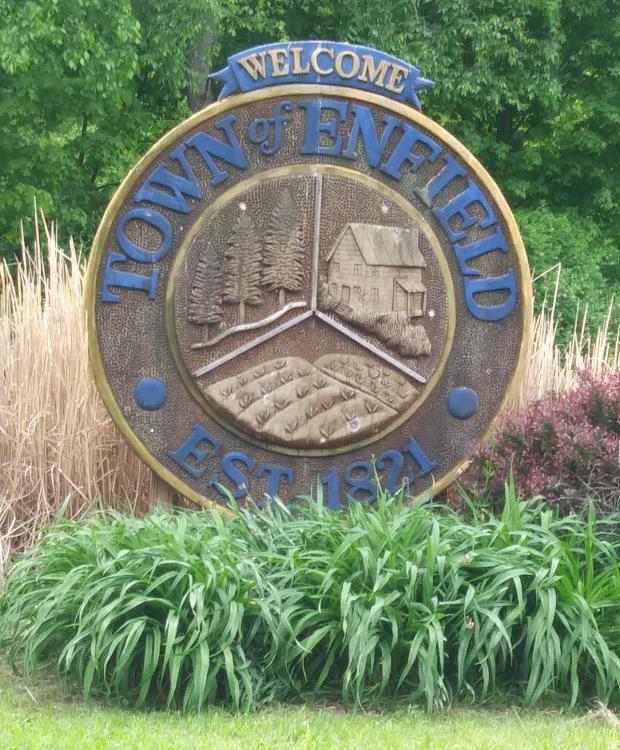
McGee’s comments were commended by many of her Board colleagues, one of whom, this writer, urged McGee to post her remarks on the Town’s website, which she has. While each member may have chosen his or her words differently, the Supervisor’s comments may be assumed to carry Town Board endorsement.
Supervisor McGee’s comments are quoted below in their entirety:
“How does an overwhelmingly white community like Enfield make a stand against systemic racism? How can we speak out against the trauma and dehumanization of our black and brown sisters and brothers?
“We can’t ignore that the lived experience of the majority of residents in the Town of Enfield is not the same as that of the black and brown community. We talk about it in person, online, and in our families and we each have an opportunity in those discussions to grow and learn with one another or to spread more division with our words.
Let’s start here.
Black. Lives. Matter.
Saying this does not mean that you have not had a hard life as a white person. It means that the color of your skin, an unchangeable characteristic of who you are, is not something that has caused your life to be more difficult. You can acknowledge that Black Lives Matter without taking away from your personal experiences with pain and adversity.
Don’t say “I am not a racist.” We are all racist. We cannot understand the experience of someone who carries the weight of hundreds of years of systemic mental, emotional, societal, and economic trauma and oppression in their hearts and in their minds with every breath they take.
We cannot fully see the privileges, even when our lives feel difficult, that we, as white people, carry and wield every day to survive and succeed- because we just expect that privilege. It’s natural to us because WE carry the weight of hundreds of years of mental, emotional, societal, and economic FAVOR in our hearts and in our minds with every breath we take.
Feeling these feelings is not our fault. But recognizing it and ignoring the responsibility to make it different is.
Black Lives Matter.
The common refrain, “All lives matter”, is often heard in communities that don’t experience racism moment by moment in housing, employment, policing of their neighborhoods or when trying to access any of the same support and opportunities that all humans deserve and some of us expect and demand.
I ask everyone here to close their eyes and think of the ways you and your family and friends think and speak about and act toward black and brown people. What has this looked like in the last month, year, or lifetime? Be honest with yourself.
If we were in the same room, I would ask you to stand up if you would like others to think or speak of you or act toward you in the same way. We would likely all remain seated because I know we understand these things in the depths of our hearts and minds. I know we can feel the injustice of it and we would not want it for ourselves.
We understand these concepts and I propose we not just make a statement about it. I ask that we do something about it. Let’s become an example for rural communities with intention- by having difficult conversations and by working to be a place that welcomes diversity and where everyone can thrive and engage and be and feel safe.
I propose that we create a council of residents and community leaders that will work to achieve this. I propose this council engage with our Sheriff, Derek Osborne, and the new Enfield Sheriff Satellite personnel so we can contribute to the conversations and work that is happening regarding policing and systemic racism.
Further, I request the Enfield Town Board invite and encourage the Public to use the Enfield Town Hall parking lot for public displays of peaceful protest.
I propose that we be a part of the solution to overcome this history of violence and oppression even if we have not lived this experience.
I want to live in that Enfield.
Beth McGee
Town Supervisor
Town of Enfield
###
Molino: Next Stage Reopening? Anyone’s guess.
by Robert Lynch, June 11, 2020
[Update: Several Upstate New York regions, including Tompkins County’s Southern Tier region, were subsequently opened to Phase 3 effective Friday, June 12th.]
Burn me once; don’t burn me twice.
“There’s no expectation we will move to Phase Three on Friday,” Tompkins County Administrator Jason Molino warned local municipal officials in his weekly morning conference call Thursday (June 11th.) “It could be Friday, it could be Saturday, it could be next week.”

Molino referred to the phased reopening of Upstate businesses by region, a step-by-step, gubernatorial-micromanaged process dictated by ongoing abatement milestones against COVID-19; that presuming success, would advance locally in precise two-week intervals.
Under such precision, Tompkins County’s Southern Tier region would progress to Phase 3 on Friday, June 12th, marked most notably by the reopening of indoor dining.
But perfection often fails when Governor Cuomo commands the controls. Two weeks ago, locals set the stage for Phase 2, only to have Cuomo’s comments in a radio interview call a halt hours before the presumed advance. Then, after Upstate conservative leaders threatened a revolt, the Governor quietly retreated and allowed Phase 2 to proceed.
Given those past circumstances, as well as speculation that State officials may want to scrutinize any post-Memorial Day rise in COVID cases, local officials Thursday stood reluctant to forecast future timetables.
With at least 40 coronavirus-related executive orders having flown off the Governor’s desk since March 12th, Molino acknowledged some of the rules have begun to trip over one another, or get lost in a sea of bureaucratic confusion.
“The executive orders are a little cloudy in terms of interpretation,” he warned. “The lines become blurred.”
For example, a directive June 5th provided that special education instruction “may be provided in person for the summer term in school districts,” subject to “State and Federal guidance.” But Molino cautioned the order does not require local districts to provide the special ed. summer school, nor does it include the “guidance” required to be followed.
Similarly, another recent directive grants stores “the discretion to require individuals to undergo temperature checks prior to being allowed admittance.” However, said the Administrator, it does not mandate such temperature checks.
Then, there are municipal meetings, a source of inquiry Thursday by Ithaca Town Supervisor Rod Howe and others. Previous orders have effectively required municipal boards to meet remotely at least through July 6th so as to keep attendance to fewer than ten people. But what about thereafter? Remote meetings require suspension of the State’s Open Meetings Law, a suspension which runs no longer than do the orders themselves.
“Can the meetings be allowed to happen at all?” became the question. “If an operation is to continue, legislation will probably map out a path,” Molino predicted, perhaps overoptimistically.
As for those Phase 3 restaurant reopenings, whenever they occur, Albany has already handed down its rules. And they prove the Nanny-State remains alive and well. Tables must be separated by no less than six feet and sit no more than ten to a table. (So much for Saturday pancakes at the Enfield Grange.) Strangers may not sit together. (One presumes the honor system applies.) Bar seating requires six-foot separation. (Not great for the pick-up scene.) Patrons must remain masked “at all times, except while seated.” Sorry, stand-up sandwich bar; you’re out of luck. Yes, Government!
###
Enfield Board advances plan to make Town Clerk, Highway Super appointive; lengthen Supervisor’s term
by Robert Lynch, June 10, 2020
In a return to the contentious atmosphere of the recent past, the Enfield Town Board Wednesday (June 10th) moved forward measures that would move the Town Clerk’s and Highway Superintendent’s positions from elective to appointive, and extend future terms of Town Supervisor from two years to four.

By identical 4-1 votes, with Councilperson Robert Lynch (this writer) the lone dissenter, the Board first agreed to discuss the change in method of selection for the two independent offices, and then scheduled a legally-required Public Hearing for June 30th, the next step toward moving any changes to a November referendum.
“I would like to hear what people have to say,” said Councilperson Stephanie Redmond, who if she became the next Town Supervisor—speculation runs rampant that she will—might become the first to benefit from the longer town officer’s term.
Councilperson Lynch, on the other hand, shouted, “Proudly No!” when Town Clerk Ellen Woods called for votes on the Hearing’s scheduling.
Referencing first the years-long controversy over wind power in Enfield, and more recently, the Board’s controversial deletion of the Pledge of Allegiance from meeting agendas, Lynch paralleled the Town’s turmoil to current national debates over racial justice, disputes where many call for unity, not division.
“Now tonight, this Board will consider stripping Enfield voters of the right to elect a Town Clerk and Highway Superintendent just because some people on this Board can’t play in the sandbox with the incumbents,” Lynch stated. “No, that’s not the way to do it.”
As many as seven separate proposed Enfield local laws would face public comment at the month’s-end hearing. Two each would remove the Clerk’s and Highway Superintendent’s future terms from control by the voters, and instead make them subject to selection by the Town Board. One of each pair of laws would actually cut short the current terms of Clerk Woods and Highway Superintendent Barry (Buddy) Rollins, ending each term at the end of this year, rather than in December of 2021.
A fifth proposed law would lengthen the Supervisor’s terms to four years. Two more proposals would apply the longer four-year terms to the Clerk and the highway chief as well. Lynch advanced these latter two measures, he’s said, “without endorsement,” seeking only to “complete the circle,” that is, to maximize the public’s options.
With seven measures up for discussion, “It’ll be a very active Public Hearing,” Supervisor Beth McGee predicted.
During the debate, McGee let slip what most have predicted, namely that she will not seek a third term in 2021.
“I’m not going to be one of the people benefiting from it,” the Supervisor said of the term-lengthening proposal. “Except that I’m going to be a Town resident,” purportedly benefiting from the longer term’s advantages.
Wednesday’s debate produced the sharpest exchanges between McGee and Woods. The Clerk predicted McGee—who first announced in March her intentions to resign, then walked back her resignation supposedly to address COVID-19—will manipulate election law to quit just in time to enable Redmond, her presumptive successor, to become Supervisor without running in a special election.
Woods accused McGee of “sabotaging the electoral process,” thereby anointing Redmond with “the political power of incumbency,” potentially catapulting her successor into “a five-and-a-half-year appointment.”
Asked at one point by McGee whether the Clerk would be present for the June 30th hearing, Woods shot back, “I will definitely be in attendance. That will be a joy for me to do!”
Just before the second vote, Woods asked to interject a further comment. McGee wouldn’t let her and appeared to mute her microphone on the zoom video conference.
“When you’re elected to the Town Board, you can comment,” the Supervisor retorted. Councilperson Lynch then asked McGee to let Woods speak, but to no avail.
Highway Superintendent Rollins, with whom McGee has sparred at recent meetings, and did so elsewhere during Wednesday’s marathon, four-hour session, took a diminished role to Woods in the Wednesday debate.
Other Board members coalesced around the Supervisor in supporting the laundry list of term-changing measures.
“I’ve never felt comfortable with how the Town has operated,” said Councilperson Virginia Bryant, who said elective administrative offices don’t jibe with her own business background.
“There are pros and cons to a longer, versus shorter, Supervisor’s term, voiced Bryant’s colleague, Councilperson Mimi Mehaffey. A Supervisor has a “huge learning curve,” she observed.
But Lynch took a different view. “What if you have a bad Supervisor?” Lynch asked, suggesting the voters might want to remove their Town’s leader, but couldn’t until his term finally ran out.
Of Tompkins County’s nine towns, only the Town of Ithaca has an appointed Highway Superintendent and Town Clerk. Most towns have four-year Supervisors, Enfield and Danby the lone exceptions.
###
Tompkins Legislators likely to seek shortened terms in ‘21
by Robert Lynch, June 4, 2020

The conflation of a delayed U.S. Census count with New York’s reformed election laws will likely prompt the Tompkins County Legislature to seek shortened one- or two-year terms of office when all 14 of the Legislature’s seats come up for a vote in 2021. The key question at present is which of several options for briefly-shortened terms the Legislature will adopt.
Thursday (June 4th), the Legislature’s Governmental Operations Committee took the first step, voting 4-1 to recommend a Local Law that would shorten the customary four-year legislative terms to just two years in the 2021 election cycle, and then return them to their four-year length at the end of 2023.
An alternative, advanced by Dryden legislator Mike Lane, though never voted on Thursday, would shorten the terms voted on in 2021 to just a single year; then make county lawmakers’ terms newly-contiguous with those of gubernatorial and congressional candidates thereafter.
Approval of the Committee’s favored option precluded consideration of Lane’s alternative. But Lane indicated he’ll advance his plan before the full County Legislature, which will begin considering the terms-of-office proposals June 16th.
Only the need to conform legislative representation with the 2020 U.S. Census—and redraw legislative district lines to reflect resulting population shifts—motivates lawmakers to propose shorter terms next year. Were the terms kept intact, candidates would not run in realigned districts until 2025, then nearly half-way to the next decennial headcount.
The Committee’s favored option, or any alternative, would require initial County Legislature consent, a public hearing, a second vote, and then a countywide public referendum in November.
Since the Enfield Town Board is considering—for different reasons—its own plans to modify the nature of multiple town offices or alter their terms, the parallel actions could create for Enfield voters a hodge-podge of referendum choices this fall.
In 2001, when the County Legislature last faced a mere one-year redistricting window between the census count and legislative elections, it met the deadline… just barely. But State Election Law was different then. Reforms enacted last year have moved candidate petitioning earlier, now commencing in late-February. What’s more, Census officials predict the COVID-19 pandemic will postpone the release of detailed population figures to as late as July 2021, or as some fear, even later.
For that reason, Government Operations Committee member Dan Klein argued against the Lane proposal, as well as against a similar, though not identical, one-year option advanced by Enfield Councilperson Robert Lynch (this writer).
“I don’t know if one year would be long enough,” said Klein, rejecting the Lane and Lynch alternatives.
Lane disagreed. By his hypothetical timetable, a Redistricting Committee could be assembled next May or June. Census Block data would then be available (he’d hope) by July 31st, with new districts drawn and adopted by December, well in time for February 2022 petitioning.
“One year is very doable,” Lane said.
Lane also found advantage in his change placing county legislative races on the same ballot with those for Governor, Congress, and frequently, U.S. Senate. “So many more voters come out then,” he said.
But others on and off the Committee said they prefer County elections to remain in the off-years, contemporaneous with those for town and city offices.
“I like to have campaigns for the County Legislature meld with the towns,” said Committee Republican Mike Sigler. Legislators Klein and Martha Robertson indicated that their municipal leaders similarly agreed.
The Committee’s lone dissenter, Ithaca’s Henry Granison, would rather leave term lengths alone and continue through 2025 with outdated district lines. “People can deal with it,” he said.
County Attorney Jonathan Wood discounted the possibility that leaving population-imbalanced districts for nearly a half-decade would subject the County to a successful legal challenge.
In satisfying the one-person, one-vote constitutional mandate, said Wood, “I don’t know of any court that said you had to change the terms (out of their normal cycle) in order to comply.”
Yet, Lane remained adamant, arguing he’d rather not wait as long as five years with “districts out of whack.”
###
Who’s in charge here? Local officials frustrated over post-COVID surprises
by Robert Lynch, June 4, 2020
Think of it akin to your daring to drive 50 miles an hour through downtown confident that the city’s lone traffic cop sits happily ensconced in the donut shop.
Increasingly frustrated and annoyed by Albany’s lack of communication and by the impulsive orders of Governor Andrew Cuomo, Tompkins County’s Administrator advised municipal leaders Thursday (June 4th) that he’s reluctant to enforce New York’s myriad of COVID-19 dictates lest the governor change them at any moment.

“We are not going to jump at every enforcement opportunity,” Jason Molino advised village mayors and town supervisors during his weekly morning conference call. Heavy-handed enforcement, later overruled, imposes “credibility problems for us as well.”
Case in point: Just the day before, alerted that a restaurant had tables outside to serve patrons, County officials moved in to alert the owner that State rules, even under the current Phase Two reopening, prohibited the practice. Then, later that night, a surprise. A new Albany directive suddenly reopened restaurants and taverns to outdoor dining. County officials found their faces covered with egg.
Molino called Wednesday a “pivotal day.” The guidance from Albany, he said, becomes less and less. There’s “no forewarning.”
So, perhaps consider Tompkins County’s current enforcement policy that of conscious disobedience, or maybe, benign neglect; like turning a blind eye to one’s lighting up a joint or igniting that backyard burning barrel.
The new policy’s next test may come within days, in a situation that could find New York’s intrusive coronavirus constraints facing down the public outrage that’s followed the Minneapolis police killing of George Floyd. Trumansburg Mayor Rordan Hart Thursday reported that a group has requested permission to hold an outdoor demonstration in his village. The Governor’s COVID rules would limit attendance to no more than ten people. Hart doesn’t care. He intends to permit the crowds to gather.
“We’re not going to be in the business of trying to enforce something that cannot be enforced,” Hart defiantly told conferees. Molino acknowledged the Mayor’s concern, suggesting the County might choose to look the other way.
Hart, showing his libertarian stripes, maintained limiting outdoor political or religious gatherings violates one’s constitutional rights. He also labeled State leaders as “the Three Stooges in Albany.”
Meanwhile, those new, suddenly-sanctioned outdoor dining rules, just like everything else State Government permits under its measured post-COVID policies, come with many an attached string. Tables must stand six feet apart. Proprietors must restrict access to their indoor rooms. They must limit pedestrian traffic. And all servers and patrons must remain masked, except when eating (thank goodness!)
As yet another point of contention, Governor Cuomo’s increasingly impetuous streak has thrown a curveball to local leaders’ municipal reopening plans. A mid-May gubernatorial executive order had supposedly accelerated to as soon as May 29th the date when governments could return to full-force operation, no longer subject to a 50 per cent work-from-home requirement. Sorry, the Governor changed his mind. Molino said that the allowance was rescinded, disseminated officially that same Friday, May 29th morning, at 1:45 AM.
With his frustration evident as in no prior week, the County Administrator cautioned Thursday he could not assure conferees that Upstate’s next step toward reopening—Phase Three—would occur, as scheduled, on June 12th.
Again, by Trumansburg Mayor Hart’s own description, the final decision, as with all of them, rests with those calling the shots: Curly, Larry, and Moe.
###
Tompkins Legislature condemns Floyd killing; pledges zero tolerance for racism
by Robert Lynch, June 3, 2020
“It’s just one small thing that we can do and a very necessary thing… It’s a first step in bearing witness.”

With those words, Ulysses-Enfield legislator Anne Koreman Tuesday (June 2nd) commenced an hour-long, emotion-drawn discussion of police violence, race, and racism before the Tompkins County Legislature, an examination culminating with the Legislature’s unanimous adoption of Koreman’s Resolution to condemn the Minneapolis police killing of George Floyd, but likewise to condemn “Institutional Racism,” which, the Resolution’s title asserts, “permeates our society.”
The somber tone of Tuesday’s discussion, among the most poignant in the Legislature’s recent history, drew some members nearly to tears. Indeed, Koreman felt compelled to ask a colleague to finish her reading of the Resolution’s text.
“We pledge to adhere to zero tolerance for expressions of discrimination, bias, harassment, or negative stereotyping towards any person or group,” the Resolution proclaims. It also resolves, “to continue to promote awareness, understanding, constructive dialog and education regarding inequity.”
While the measure was prompted by and focused primary attention upon the May 25th killing of the unarmed George Floyd during his Minneapolis arrest, as well as upon other high-profile African-American deaths at the hands of whites, Tuesday’s strongly-worded Resolution broadened to the wider issues of systemic racism, maintaining that, “The historic and current realities of racism represent a singular, persistent stream of brutal oppressive force that has yet to be mitigated.”
The Resolution declined to reference—or condemn—the multi-city violence and looting which quickly erupted following Floyd’s death. Of note, none of the Legislature’s three Republicans took part in Tuesday’s discussion, though all supported the adopted measure.
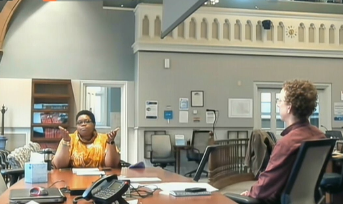
“I’ve watched people talk about we’ve got to stop with the destruction of property; the property, the property,” Legislature Chair Leslyn McBean-Clairborne, one of the body’s two African-American members, observed, addressing her colleagues online from Legislative Chambers during the meeting’s most heart-stopping moment. “And I say, do you really want to balance a man being murdered with the destruction of property? Is that really what you want to do?”
McBean-Clairborne continued her more than eight-and-a-half minute monologue, referencing the Floyd killing:
“To those officers who were just standing by and doing nothing, shame on you. I’m at the point where I don’t want the video after the fact any more. I need people to do more than just watch a video and then we can all see it after somebody is dead. We can’t bring them back… Don’t call me after my son or my husband or my friend is dead. Don’t call me then. Let’s do something.”
Invited to join the discussion, Tompkins County Sheriff Derek Osborne told legislators that the Floyd killing stood “as a pure example of failed leadership” by Minneapolis police. Osborne said the stains of such well-publicized police killings tarnish his own efforts to earn interracial respect.
“It’s a complete tragedy,” the Sheriff said of Floyd’s killing. “I’m not proud of the fact when such evil as that permeates my profession and reverses the good that we have done.”
But for many on the Legislature, addressing the Minneapolis incident was a mere point of launch, not the final objective.
“White people started this,” asserted Koreman, who marched history back 400 years when Africans, in her words, were “kidnapped.”
“What brought Americans to that point that we thought it was OK to satisfy our greed to make more money that we could take human beings and bring them here and treat them as animals?”
Legislator Deborah Dawson took on President Trump. To the President, Dawson asserted, law and order is what “police administer on behalf of white people and very fine people like the white supremacists at Charlottesville.”
An angry Dawson diminished the Resolution as “just pretty words,” arguing that what’s really needed are “real steps to make sure that this crap doesn’t happen and keep happening the way it has been.”
Former Legislature Chair Martha Robertson brought her worries home to Dryden, where this summer she’s welcoming a grandson adopted from Zambia, now an adolescent.
“He went for as long, healthy walk today,” Robertson said. “I couldn’t stop thinking about, here’s this tall black kid running down the street by himself. So I didn’t want him to run beyond where I could see him.”
###

